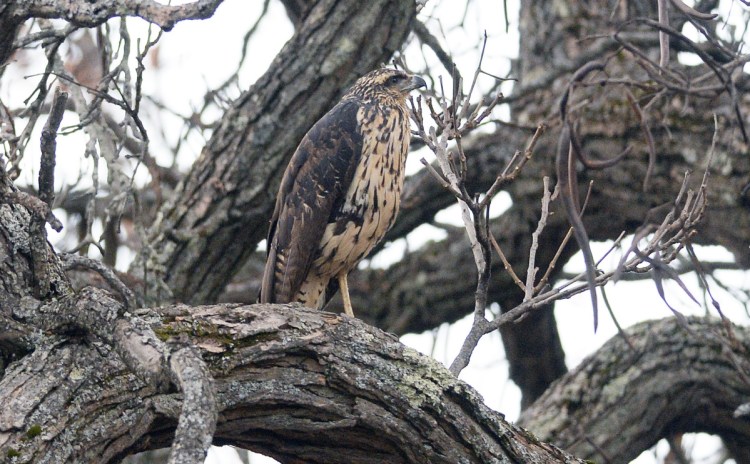The great black hawk that was euthanized after it took up residence in Deering Oaks park and sustained frostbite during a storm in January will be mounted and displayed at the Maine State Museum.

This great black hawk captured widespread attention during its time in Maine. Photo courtesy Avian Haven
Maine state raptor biologist Erynn Call said the Maine Department of Inland Fisheries and Wildlife made the decision to display the large hawk, which is native to Central and South America. She said the hawk’s plight tells the story of how birds – called vagrants by ornithologists – can fly off course and end up far from their usual habitats.
“IFW did make the decision on the great black hawk, and it will be at the Maine State Museum,” Call said. “I wouldn’t call it a non-native, I’d call it a migrant. To our knowledge, it did come here by the natural process of migration. This happens to other species of birds as well.”
It was only the second time a great black hawk was seen in the United States, Maine Audubon said.
The raptor captured widespread attention from birders and the general public after it settled and foraged for mice and rats in the Portland park, thousands of miles from its native range, from late November until it was found unable to fly during a snowstorm on Jan. 20.
Terra Fletcher and her husband, Dan Legnard, found the hawk on the ground after they had ventured out into the storm on skis because they were worried about the hawk’s ability to survive the winds and cold. Fletcher, who has trained as a falconer, contacted Avian Haven, a wild bird rehabilitation center in Freedom.
The raptor was transported to the rehabilitation center, which posted updates on the bird’s declining health, while working to save it. Ultimately, the hawk was euthanized because the frostbite on its legs was so severe that it wouldn’t have been able to perch or capture prey, Avian Haven said on Jan. 31. Avian Haven declined Monday to comment on the plan to display the raptor at the Maine State Museum.
The great black hawk was first seen in Maine on Aug. 6, Maine Audubon said. Call said the bird’s migration story will be an important one to tell to the public, and the Maine State Museum is the perfect organization to tell that story.
Deirdre Fleming can be contacted at 791-6452 or at:
dfleming@pressherald.com
Twitter: FlemingPph
Send questions/comments to the editors.



